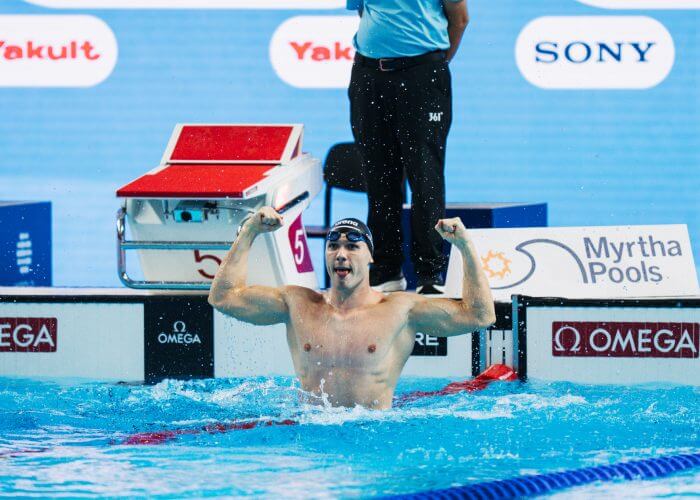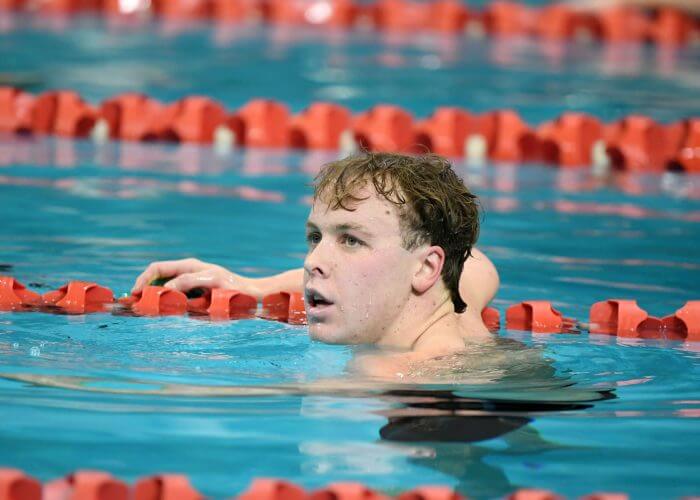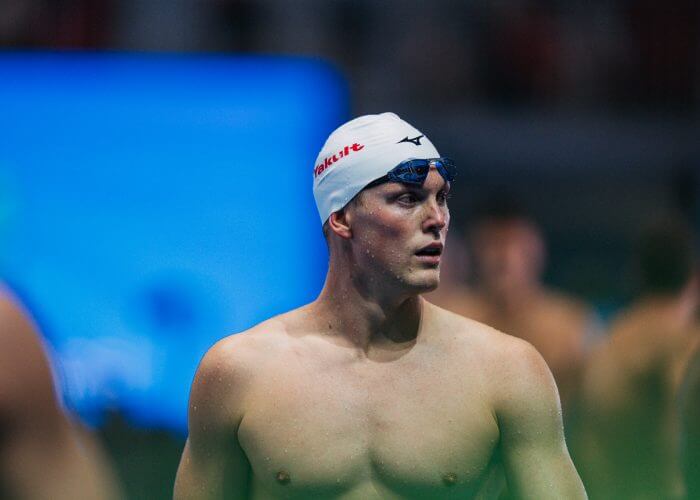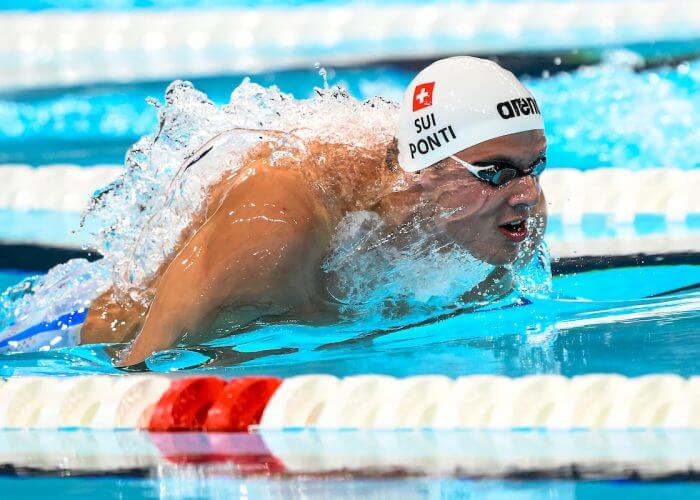Ranking the Top-20 Men’s Swimmers in the World, Part I (16-20): Short Course World-Record Holders Stand Out
At the recent World Championships, swimmers competed for medals in 42 pool events, and the results clearly show the best swimmer in the world for each race. Comparing swimmers across events is a subjective task, with factors including versatility, dominance, longevity, big-race performance and relay contributions all considered. With the summer competition season concluded, we will again try to stack up the various competitors from one through 20.
These rankings will be based largely on performances at the World Championships but results from other meets will be considered. Swimmers who sat out this year’s major competitions will not be included on this list.
Honorable Mention
Determining which swimmers should make the cut for the top-20 was a tough task, and it required the omission of several strong candidates. That includes junior-level standout breaststrokers Filip Nowacki and Shin Ohashi, who went 1-2 in the 100 and 200 breast at the recent World Junior Championships. Nowacki actually swam faster than the winning time at the senior-level Worlds while Ohashi was just off that time.
The puzzling Pan Zhanle did not make the cut only one year after posting an otherworldly 100 freestyle world record of 46.40 at the Paris Olympics. This time, Pan did not qualify for any individual finals at Worlds, although he did collect a relay silver. The other Olympic champion to fall off the list is Dan Wiffen, the distance swimmer who battled appendicitis prior to Singapore.
Ilya Kharun was barely left off despite winning 100 fly bronze at Worlds. He fell off the podium in the 200 fly and missed the 50 fly final despite entering the meet with the world’s quickest time. Miron Lifintsev was the leadoff backstroker on two gold-medal-winning medley relays for the neutral athletes (mixed and men’s), and his best 100 back leadoff would have been the second-fastest time ever, although it was unofficial since it came in a mixed-gender event. If Lifintsev can bring that speed to individual events, he will be part of future rankings of the top-20.
American Shaine Casas was cut despite his remarkable performance in the 200 IM at Worlds, where a time of 1:54.30 made him the fourth-fastest performer in history and just off Ryan Lochte’s world record from prior to the meet. But Casas was baffling in his other events, failing to make it out of prelims in the 100 butterfly or 50 backstroke and losing his spot on the U.S. men’s 400 medley relay.
There was also no room on the list for France’s Yohann Ndoye-Brouard, who boosted his global standing tremendously with a pair of bronze medals in the 100 and 200 back in Singapore. Ndoye-Brouard filled out the fastest podiums ever in both events as he broke 52 in the 100-meter event and swam under 1:55 for the first time in the 200.
20. Nicolo Martinenghi, Italy
Nicolo Martinenghi — Photo Courtesy: Emily Cameron
Narrowly making the cut for the top-20 is an Italian breaststroker who has been among the world’s most consistent swimmers in the last half-decade. Martinenghi won his first Olympic medal in the 100-meter race in Tokyo, and he has not missed a major podium in the event since, wracking up three medals at the Olympics, eight at the long course World Championships and 10 at the 25-meter edition of the global meet. His career highlight came last year in Paris, when he took down the likes of Adam Peaty, Nic Fink and Qin Haiyang to win Olympic gold.
This year was not his finest but still plenty solid, with the 26-year-old remaining entrenched among the world’s elite in the 100 breast. In the World Championship final, Martinenghi had the lead most of the race, and even though he could not hold off Qin down the stretch, he still clocked 58.58 for a silver medal. Notably, his time was almost a half-second ahead of the mark which he swam to win Olympic gold. Martinenghi almost won a second medal thanks to his strong breaststroke leg on Italy’s 400 medley relay, only for the American team to finish a tenth ahead.
19. Simone Cerasuolo, Italy

Simone Cerasuolo — Photo Courtesy: Emily Cameron
Yes, two consecutive Italian breaststrokers, albeit from very different background. The 23-year-old Cerasuolo has never raced at the Olympics, with his specialty 50-meter race never previously included in the program (that will change in 2028). Prior to this year, his top career accomplishments had come in 2022, when he won silver at the European Championships in the 50 breast and bronze in the same event at the Short Course World Championships.
Cerasuolo was not even a lock to represent Italy in the 50 breast at Worlds, with Martinenghi always a contender in the event and Ludovico Viberti swimming the world’s fastest time in the event in June. But Cerasuolo had a lane in Singapore and took full advantage, securing a surprise gold medal. His winning time in the final was not the fastest in the world this year, not his fastest time of the meet and slower than the top-qualifying mark out of both prelims and semifinals, but it was good enough for gold, and coming through in the big moments counts here.
18. Sam Short, Australia

Sam Short — Photo Courtesy: Delly Carr / Swimming Australia
He was one of the best distance swimmers in the world in 2023, capturing the world title in the 400 free plus global medals in the 800 and 1500, but Short had a disappointing Olympic debut in Paris. In his first Olympic final, he missed the 400 free podium by 0.14, and he was locked out of the top-eight in both longer races. But his return to global competition this year would bring significant improvement as Short put a scare into the man who has established himself as the world’s superior 400 freestyler over the past two years.
In the opening final in Singapore, it was almost impossible to split Short and Lukas Martens in the men’s 400 free. Short led for the majority of the race’s back half, only for Martens to close a couple ticks quicker to finish two hundredths ahead. Short ended up with silver, with his prelims time of 3:42.07 the quickest of the meet. After the 400, Short would win no further medals, with a gastrointestinal illness forcing him out of the 800 free final before he rebounded to place fourth in the 1500.
17. Luke Hobson, United States

Luke Hobson — Photo Courtesy: Emily Cameron
The U.S. men’s team has struggled in international waters in recent years, with just six individual medals at the Paris Olympics and again at this year’s World Championships. But Hobson is doing his part, quickly building a track record as America’s most successful 200 freestyler of the 21st century aside from Michael Phelps. Hobson first reached the international podium last year, with a bronze at the Doha World Championships and another at the Paris Olympics, and he added a short course world title and world record in the 200 free in December. This year, he took a significant step forward.
Hobson put on a show in his signature event at U.S. Nationals, clocking 1:43.73 to become the fifth-fastest performer ever in the event. In late July, he set out in pursuit of a world title and nearly got it, only to find himself on the receiving end of David Popovici’s patented finishing surge. Still, Hobson got under 1:44 again on the way to silver. Later in the meet, the American men missed the podium in the 800 free relay, but Hobson did his part, splitting 1:43.45 to move the Americans from sixth place into a short-lived lead.
16. Noè Ponti, Switzerland

Noè Ponti — Photo Courtesy: Andrea Staccioli / Deepbluemedia / Insidefoto
If this list were based exclusively on short course results, Ponti would undoubtedly rank much higher after his sensational short course performances last fall. In less than two months, Ponti blasted the 50 butterfly world record four times, knocking more than four tenths off the world record in total. His last record in that event came at the Short Course World Championships in Budapest, where he also knocked off a Caeleb Dressel world record in the 100 fly and secured an additional gold in the 100 IM.
In long course, Ponti returned to the global-level podium in long course for the first time in four years. He was a virtual unknown back at the Tokyo Olympics when he joined legends Caeleb Dressel and Kristof Milak as medalists in the 100 fly. This time, he was surpassed only by Maxime Grousset in the sprint fly events in Singapore. In the one-lap race, Ponti came in only three hundredths away from gold while becoming the fifth-fastest man in history, and his time of 49.83 in the 100 was also good for No. 5 on the all-time list.
